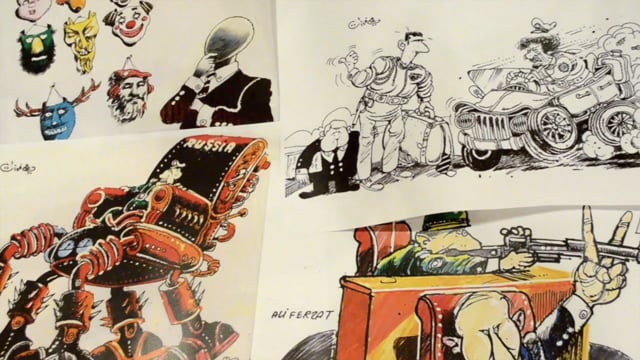[WATCH] The cartoonist who broke the barriers of fear
Ali Ferzat, whose work has irked many regimes in the Middle East and beyond, said the terror experienced in France is the same as the terror experienced in Syria


“If artists and intellectuals are irreverent towards regimes, than it is the ones in power who are in danger, not us,” exiled Syrian cartoonist Ali Ferzat said.
The murder of the Charlie Hebdo cartoonists and the riots following the publication of cartoons depicting the Prophet Mohammed in Denmark showed the world the power of cartoons and how intolerant and foolishly violent humans can be.
In both cases, the victims were Westerners and the crimes were committed by slighted Muslims.
However, rarely do we hear of cartoonists on the other side of the fence.
Ferzat was awarded the Sakharov Prize for Peace and in 2012 he was named one of the world’s 100 most influential people by Time magazine.
This week he was in Malta at the invitation of the European Parliament office in Malta and in a brief interview with MaltaToday, Ferzat said the terror experienced in France is the same as the terror experienced in Syria.
“Terrorism is the product of regimes, be they Russian, Syrian or whatever. There is no difference between the terror of Daesh (ISIS) and of dictatorial regimes. Regimes create an enemy so they remain the better alternative. But at the end of the day, both terrorists and regimes kill authors, artists, intellectuals and whoever opposes them. It’s two sides of the same coin.”
Ferzat is one of the Middle East’s most important living artists and his work has irked many regimes in the region and beyond.
His satirical drawings and caricatures of political figures have been widely published at home and abroad, won international awards and been banned in several countries whose leaders have found themselves at the sharp end of his pen.
Most notably, Ferzat’s drawings of Syrian President Bashar al-Assad earned him a savage beating by the regime’s thugs, who shortly after the Syrian uprising in 2011, was seized in the streets of Damascus and had both his hands shattered.
Now living in exile in Kuwait, Ferzat said “over 10,000 years, Syria witnessed many wars and conflicts but the country is bigger than individuals. Regimes and their leaders come and go but nations remain, and so will Syria.”
Asked whether his drawings have fostered change, he said that if cartoonists, authors and intellectuals do not go in hiding they will foster change.
He was one of the first to criticise Assad and other “untouchables” in 50 years and this helped people beat the fear barrier.
Ferzat said that the regime might have broken his bones, “but I broke the barrier of fear”.
“Assad was untouchable and so were ministers, public officials and police officers. When my cartoons were published, people thought I was either abroad or out of my mind. I had to ask myself whether I wanted to be a genuine artist or a liar and a hypocrite.”
Ferzat, who began criticising the brutal regime before the civil war broke out in 2011, added that “the Syrian people are intelligent and capable of interpreting cartoons and in fact my cartoons were carried by people in protest against the regime at the start of the civil war.”
Since the beginning of the unrest, some 500,000 have been killed and at least 7,600,000 were forced to leave their homes.
However, Ferzat has not lost hope.
“Sometimes, the sea is contaminated by an oil spill but the sea purifies itself. The Baath party has been in power for 50 years and I liken it to moving into a new house which has been uninhabited for 50, where if you open a tap, the water will be rusty at first but after a while clean water will come out.”
Despite his personal woes, he said “I do what I do for future generations and when I die, I can do so in the knowledge that my son and grandson can live with their heads held high.”
Asked whether he censors himself, Ferzat said “I do not censor myself but I am very careful to avoid hurting anyone personally. I am very, very critical but at the same time respectful.”








.jpg)




.jpg)






.png)


